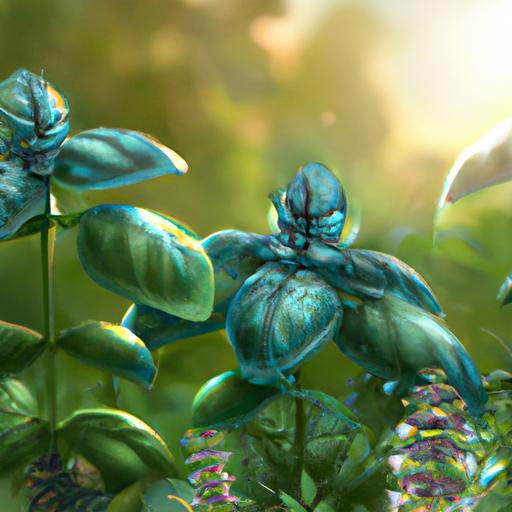Are you wondering why your basil isn’t as fragrant as it should be? Many gardeners are familiar with the unmistakable aroma of basil, and it can be quite perplexing as to why your plants are not producing that same aroma.
In this article, we’ll discuss the reasons why your basil might not be quite as fragrant as it should be, and provide helpful tips to get it back to its aromatic best.
From environmental factors to over-fertilization and harvesting too early, we’ll cover all the elements that can affect the fragrance of your basil and help you adjust your gardening habits to ensure that your basil is as fragrant as possible.
Table of Contents
Short Answer
Basil is known for its fragrant aroma, so if your basil is not fragrant, there are a few possible explanations.
It could be that the plant is too young and not mature enough to produce the desired scent.
Or, it could be that the plant is not getting enough sunlight or water, both of which are essential for basil to produce its distinct scent.
Finally, it could be that your basil variety is not naturally fragrant.
What Makes Basil Fragrant?
Basil is a popular herb that is prized for its fresh, sweet, and fragrant aroma.
The fragrant compounds in basil, known as essential oils, are released when the leaves are disturbed or crushed.
Every variety of basil has slightly different concentrations of essential oils, which give it its distinct flavor and aroma.
In addition to its fragrant aroma, basil is also used in cooking for its mild peppery flavor.
Unfortunately, many gardeners have experienced the disappointment of harvesting basil that is not fragrant.
This can be disheartening, as a lack of fragrance can indicate that the basil is not as flavorful or as fresh as it could be.
Fortunately, there are a few reasons why your basil may not be fragrant, and understanding these reasons can help you adjust your gardening habits and ensure that your basil is fragrant and flavorful.
The most common causes of lack of fragrance in basil are environmental factors, over-fertilization, and harvesting too early.
Let’s take a look at each of these factors in more detail.
Environmental Factors.
Environmental factors, such as temperature and humidity, can have a significant impact on the fragrant compounds in basil.
If the temperature is too hot or too cold, the essential oils in the leaves can be suppressed, leading to a lack of fragrance.
Additionally, if the environment is too humid, the essential oils will evaporate quickly, leading to a lack of fragrance.
Over-fertilization.
Over-fertilization can also lead to a lack of fragrance in basil.
Fertilizers provide essential nutrients to the plants, but if too much fertilizer is used, the basil can become stressed and produce fewer essential oils.
This can result in a lack of fragrance in the basil.
Harvesting Too Early.
Finally, harvesting too early can also cause a lack of fragrance in basil.
If the basil is harvested before it has had a chance to develop its essential oils, it will not be as fragrant or flavorful.
It is important to wait until the basil is fully grown before harvesting it.
By understanding the causes of a lack of fragrance in basil, you can adjust your gardening habits and ensure that your basil is fragrant and flavorful.
With a few simple adjustments, you can ensure that your basil is fragrant and delicious.
Environmental Factors

When it comes to why your basil may not be fragrant, environmental factors may be to blame.
After all, basil is a warm-weather herb that thrives in temperatures between 68-77F.
If the temperatures are too cold, the plant may not produce the fragrant oils and aromas that it is known for.
Additionally, basil prefers full sun and moist, well-draining soil.
If your plant is not receiving enough sunlight, or if the soil is too dry or too wet, it could negatively affect the flavor and aroma of the plant.
Additionally, if the plant is overcrowded and not getting enough air circulation, it may also be affected.
Finally, if the plant is exposed to too much wind or cold drafts, it could also cause the basil to lack flavor and aroma.
To ensure that your basil is fragrant and flavorful, make sure that it is receiving the proper amount of sunlight, is planted in well-draining soil, and is not subject to cold drafts or too much wind.
Over-Fertilization
When it comes to growing any type of plant, over-fertilization is a common problem that can lead to many issues.
When it comes to basil, over-fertilization can lead to a lack of fragrance.
Too much fertilizer can cause the plant to focus its energy on producing more foliage instead of essential oils which give basil its unique scent.
This can cause the plant to become large and leafy without the signature aroma associated with basil.
To prevent this issue, it is important to use the right amount of fertilizer and monitor your plants closely to make sure they are getting the right amount of nutrients.
Additionally, opting for a fertilizer that is specifically designed for herbs can help ensure that the nutrients are tailored to the needs of your basil plants.
Harvesting Too Early

Harvesting your basil too early is one of the most common causes of basil that lacks fragrance.
Basil is most fragrant when it is harvested at the flowering stage, when the leaves are at their peak of flavor.
When harvested too early, the basil will not have had enough time to develop its full flavor and aroma, resulting in a less fragrant product.
It’s important to wait until the basil flowers before harvesting, as this will ensure that you’re getting the most flavor and fragrance from your basil.
Additionally, harvesting too much basil at once can also reduce the flavor and fragrance of the plant, as it may not have had enough time to replenish its essential oils.
To ensure that your basil is as fragrant as possible, try harvesting smaller amounts over a longer period of time.
Tips for Growing Fragrant Basil
Growing fragrant basil can be a rewarding experience, especially when the herb is used in cooking, teas, or added to a salad. While basil may not always be fragrant, there are steps gardeners can take to increase the chances of having a fragrant plant. Here are some tips for growing fragrant basil:
1. Provide the Right Conditions: Basil prefers a warm, sunny spot with well-drained soil. Make sure to water the plant regularly, but be careful not to oversaturate it.
2. Fertilize Correctly: Over-fertilizing can lead to a lack of fragrance in your basil. To ensure that your basil is fragrant, use a balanced fertilizer.
3. Harvest Correctly: Basil should be harvested before the flowers open, as this is when the plant has the highest levels of essential oils. To harvest basil, use sharp scissors or pruning shears and cut just above a set of leaves.
4. Store and Use Properly: To get the most out of your fragrant basil, make sure to store it properly. Basil should be stored in a cool, dry place. To use the herb in cooking, add it at the end of the cooking process to preserve the flavor and aroma.
By following these tips, you can increase your chances of having a fragrant basil plant.
With the right conditions and proper care, you can have an abundant crop of fragrant and flavorful basil.
Adjusting Your Gardening Habits

When it comes to growing fragrant basil, it is important to adjust your gardening habits to ensure that your basil is fragrant and flavorful. Here are some tips to help you get the most out of your basil plants:
1. Plant your basil in full sun, as basil needs at least six hours of direct sunlight per day in order to thrive.
2. Amend the soil with organic matter such as compost or manure to ensure your basil has adequate nutrients.
3. Avoid over-fertilizing your basil plants, as this can cause the leaves to become bitter and reduce the fragrance of the plant.
4. Water your basil plants regularly and deeply, as this will help keep the soil moist and encourage the growth of fragrant leaves.
5. Harvest your basil when the leaves are at their peak of fragrance, as harvesting too early can reduce the flavor and fragrance of your basil.
By following these tips, you can ensure that your basil plants will be fragrant and flavorful.
With a bit of care and attention, you can enjoy the aroma and flavor of your basil for many months to come.
Pests and Disease
Pests and disease can also be a factor in why your basil is not fragrant.
Pests such as aphids and whiteflies can feed on the leaves of basil, and can cause them to become discolored and distorted.
Additionally, these pests can transmit diseases that can affect the aroma and flavor of basil.
To prevent this, it is important to regularly inspect your basil for signs of pests or disease.
If you do find any, it is important to treat it right away to prevent further damage to your basil.
Additionally, using a natural insecticide can help to keep pests away from your basil and ensure that it remains fragrant and flavorful.
Final Thoughts
Basil is a beloved herb known for its fragrant aroma, but unfortunately, it may not always be fragrant.
Understanding the possible causes of this can help you adjust your gardening habits to ensure that your basil is always fragrant and flavorful.
Environmental factors, over-fertilization, and harvesting too early can all play a role in the lack of fragrance.
To ensure the best results, try to avoid these factors and adjust your gardening habits accordingly.
With the right care, you can have fragrant basil all season long!

